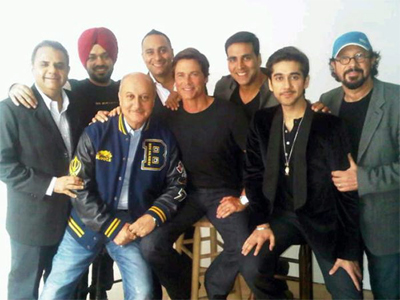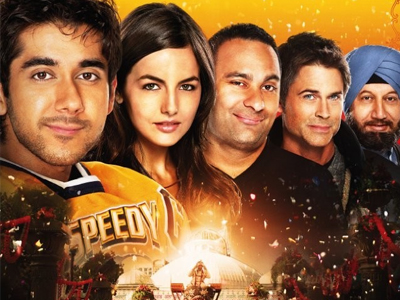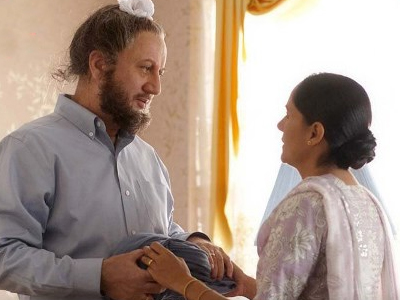 Mr. Anupam Kher is a Bollywood legend. His filmography includes over 450 Indian films as well as roles in the UK, Hollywood, and even China. For instance, we all remember his fabulous performances in Gurinder Chadha’s Bend it Like Beckham and Bride and Prejudice. We have seen him in the Hollywood film, The Other End of the Line, and in the Chinese film Lust, Caution. Lucky for us, Mr. Kher’s illustrious career is still going strong with several Indian film releases and a new international project Breakaway aka Speedy Singhs. With Breakaway, he was part of a new experience because the film was Canadian/Indian/Hollywood production. It was filmed in Canada, produced by India’s Akshay Kumar, and directed by Hollywood’s Robert Lieberman and stars actors from Hollywood, India, UK and Canada.
Mr. Anupam Kher is a Bollywood legend. His filmography includes over 450 Indian films as well as roles in the UK, Hollywood, and even China. For instance, we all remember his fabulous performances in Gurinder Chadha’s Bend it Like Beckham and Bride and Prejudice. We have seen him in the Hollywood film, The Other End of the Line, and in the Chinese film Lust, Caution. Lucky for us, Mr. Kher’s illustrious career is still going strong with several Indian film releases and a new international project Breakaway aka Speedy Singhs. With Breakaway, he was part of a new experience because the film was Canadian/Indian/Hollywood production. It was filmed in Canada, produced by India’s Akshay Kumar, and directed by Hollywood’s Robert Lieberman and stars actors from Hollywood, India, UK and Canada.
Breakaway is a cross-cultural hockey drama set in the Indo-Canadian community of Toronto. It tells the story of Rajveer Singh, played by Vinay Virmani,a young man caught between two cultures and two sets of ideals. Rajveer, who was raised in an orthodox Sikh family, has only one goal – to succeed in the traditional white man’s sport of ice hockey. Conflict arises when his strict Punjabi father (Mr. Kher) does not want him to follow that path but wants him to follow the one he thinks is right and better for him. On a busy promotional tour, Mr. Kher took time out to speak with us for a few minutes about his role, working with such an international team and why he approaches every film as a newcomer!
What attracted you to the role in the film?
Well, I like to do English language films because they reach a certain kind of audience, which I may not sometimes reach as an actor. So I’d like to do that. Number two, the role is excellent, and number three it had an interesting international cast which includes Rob Lowe, Russell Peters and Camilla Belle and it had an American director. So it had a good package and I loved it.
 So, tell us a little bit about you character in the film.
So, tell us a little bit about you character in the film.
I play a Sikh character called Darvesh Singh. It’s like any first generation Indian anywhere in the world. The fact that they shift to another country, they have this fear of losing their roots. So they tend to be overprotective. I think it comes with a sense of guilt also somewhere. This is always, you will see anywhere in the world, the first generation and second generation and third generation has great amount of gap between them. They have genuine reasons also. They feel that they somehow came and struggled in this country and they must obviously be feeling the racial discrimination that comes along with it and they don’t want their children to face it. And when the children take up something, which will expose them to an obvious onslaught of racial discrimination, they are protective towards them. That is what Darvesh Singh feels when he comes to know that his son wants to be in a game that is only represented by whites, which is ice hockey. He’s horrified and he doesn’t want his son to go through what he thinks he’s gone through. When you mix in a crowd you somehow pass off, but when you single out yourself then you are more prone to attack. That’s why also, apart from that the father-son conflict, is that point of view of the conflict, which is very, very, very, very fascinating how traumatic it is, but it is fascinating. You will usually see, not necessarily always, but you will usually see in a family the father and daughter together bonding and a son and mother bond. A father and son, I think the growing ego of the father and the growing ego of the son comes between them. You know a son feels that he has grown up and he doesn’t need his father, and the father feels that rather than being the father he has to play the role of a father. So these are the fascinating elements, which I would like to interpret and project in the film. I’ve seen the film now at the Toronto International Film Festival and I’m happy with the result.
Tell us about working with the director Mr. Robert Lieberman.
It was fun! Fun because I had seen his film Table for Five and I had liked it and he had done another ice skating film, though this is not an ice skating film, it is hockey. This is a father and son conflict and in the background is the hockey. It was nice working with him. He knew what he wanted and he was flexible at the same time. He respected my body of work that I bring along. He’s a polite, genuine, funny, warm kind of person. So it worked on both the levels had he been a good director and not a nice person to work with then it would have been not a nice combination, but luckily he’s a nice, warm, affectionate person.
There was such a mix of cast like from you to Rob Lowe to newcomer Vinay. How was it working in that mix of people?
It’s wonderful to work with people who know their craft. You know, it’s Rob Lowe and in that he knows what he’s doing. So it’s wonderful. You get into a sense of silent competition, which is very healthy. You know you think I am now matching the same kind of racehorse I am, let’s see. You start playing these internal funny games with yourself with the idea of growing as an actor, not with an idea of eclipsing the other actors. I’ve done enough work to sort of feel like that. It’s wonderful. Russell Peters is very funny and Camilla Belle though comparatively a newcomer, not much work, but it was wonderful working with them. With newcomers like Vinay, they also bring a certain kind of sincerity, which usually a newcomer always sort of conveys. Newcomers bring a certain amount of unsureity about themselves, which is very, very attractive because it looks real. Their performances look real, which I learn a lot from because we lose that when you do lot of work. You lose a lot of spontaneity. That’s why I work with newcomers, because I learn the value of spontaneity in acting.
And that’s interesting because Vinay told me you seemed to approach this as a first film.
 Yes! Because I like to approach it that way, now that I’m comfortable with myself as an actor, I don’t have to keep proving it now. I don’t feel retired at all and not for another 30 years, yeah at least, thanks, so I approach a film completely from a newcomers’ perspective. I play games with myself as I said earlier. I said, ‘Okay, just let me do this emotion like this’. I try and make my job difficult.
Yes! Because I like to approach it that way, now that I’m comfortable with myself as an actor, I don’t have to keep proving it now. I don’t feel retired at all and not for another 30 years, yeah at least, thanks, so I approach a film completely from a newcomers’ perspective. I play games with myself as I said earlier. I said, ‘Okay, just let me do this emotion like this’. I try and make my job difficult.
What are audiences are going to love about the film?
It has great performances. It has great joy in telling the story. It’s a story about an underdog which audiences always love, fantastic music, its pacey, and entertaining and I think it’s great!
And you’ve worked with Akshay Kumar as a producer.
I did the film on just one call from Akshay Kumar. I did not even read the script.
Since it is such an amalgamation of cast and crew from all over the world can you see this as a new road for films?
Yes, it is! It is going to be a trend soon. India is accepted because of economic reasons also because Hollywood sees their releases and movies do wonderful business there also. So they will feel the need of including Indian technicians, Indian actors. There will be lot of such movies that will be made.
Breakaway, aka Speedy Singhs, released in India on the 23rd and is making its way into the world including Canada, the US and UK on the 30th! We would like to thank Mr. Kher for speaking with us again. It is always an amazing experience and we wish him all the best.










